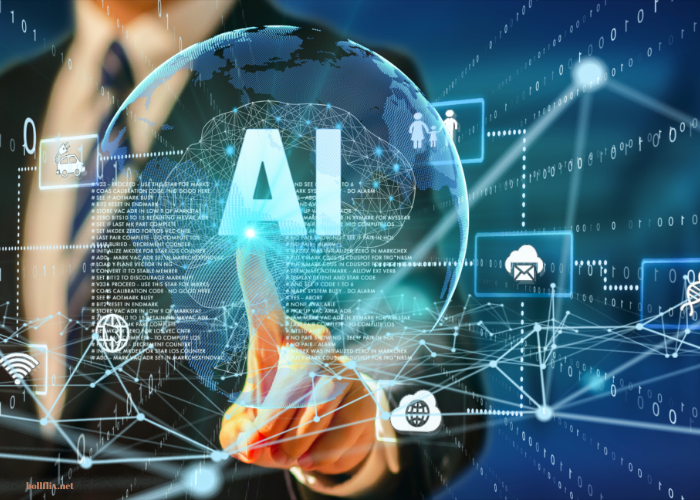In today’s digital era, businesses are continually searching for innovative solutions to enhance their operations, improve customer experiences, and boost profitability. Among the most transformative technologies in recent years, artificial intelligence (AI) and machine learning (ML) stand out as game-changers, reshaping industries and driving unprecedented growth. The AI revolution, powered by advancements in machine learning, is enabling businesses to achieve new heights by harnessing data, automating processes, and creating smarter decision-making frameworks. This article explores how businesses are leveraging machine learning to propel growth and stay ahead in an increasingly competitive landscape.
Understanding the AI and Machine Learning Landscape
Before delving into the ways businesses are using machine learning for growth, it’s essential to understand the relationship between AI and machine learning. AI is a broad field that encompasses various technologies designed to mimic human intelligence, including problem-solving, natural language processing, and vision. Machine learning, a subset of AI, focuses on the development of algorithms that enable computers to learn from and make decisions based on data. Machine learning algorithms are particularly effective in identifying patterns and making predictions, making them valuable assets for businesses across all sectors.
Enhancing Customer Experiences with Machine Learning
One of the most significant impacts of the AI revolution has been the enhancement of customer experiences. Machine learning algorithms can analyze vast amounts of customer data to uncover insights into preferences, behaviors, and purchasing patterns. This information allows businesses to create highly personalized experiences for their customers, increasing engagement and loyalty.
For example, e-commerce giants like Amazon and Alibaba use machine learning to recommend products to their customers based on previous purchases, browsing history, and even what similar customers have bought. These personalized recommendations not only improve the shopping experience but also significantly increase sales. In the hospitality industry, hotels are using machine learning to tailor guest experiences, from recommending local attractions to customizing room amenities based on guest preferences.
Optimizing Operations and Reducing Costs
Machine learning is also transforming business operations by optimizing processes and reducing costs. Predictive maintenance is one area where machine learning has shown substantial benefits. By analyzing data from machinery sensors and predicting when equipment is likely to fail, companies can perform maintenance only when needed, rather than on a fixed schedule. This approach not only extends the lifespan of equipment but also reduces downtime and maintenance costs.
In supply chain management, machine learning algorithms can predict demand more accurately, allowing businesses to optimize inventory levels and reduce the costs associated with overstocking or stockouts. Retailers like Walmart and Target are already leveraging these algorithms to improve their inventory management, ensuring they have the right products in the right quantities at the right time.
Driving Innovation Through Data Insights
Data is often referred to as the new oil, and machine learning is the engine that turns this raw data into valuable insights. Businesses that can effectively leverage their data have a significant competitive advantage. Machine learning models can process and analyze vast amounts of data far more quickly and accurately than humans, uncovering trends and insights that would otherwise go unnoticed.
These insights can drive innovation in various ways. For instance, in the financial sector, machine learning algorithms are used to identify patterns in market data that can predict stock price movements, allowing firms to make more informed trading decisions. In product development, companies can use machine learning to analyze customer feedback and social media data to identify emerging trends and consumer preferences, guiding the development of new products and features.
Automating Routine Tasks with Machine Learning
Automation is one of the most visible aspects of the AI revolution, and machine learning plays a crucial role in this transformation. By automating routine tasks, businesses can free up human employees to focus on more strategic and creative work, increasing productivity and job satisfaction.
In the customer service domain, for example, machine learning-powered chatbots are now handling a significant portion of customer inquiries, providing instant responses to common questions and resolving issues without the need for human intervention. This not only reduces the workload for customer service representatives but also improves response times and customer satisfaction.
Similarly, in the manufacturing sector, machine learning algorithms are being used to automate quality control processes. By analyzing images of products on the production line, these algorithms can detect defects and anomalies with a high degree of accuracy, ensuring that only products that meet quality standards reach the customer.
Enhancing Decision-Making Capabilities
Effective decision-making is at the heart of business success, and machine learning is enhancing this capability by providing businesses with more accurate and timely information. Machine learning algorithms can process large datasets in real time, allowing businesses to react quickly to changing conditions and make data-driven decisions.
In the financial sector, for example, machine learning is being used to develop credit scoring models that can assess a borrower’s creditworthiness more accurately than traditional models. These models consider a wider range of factors and can update in real-time, providing lenders with a more comprehensive view of risk. In marketing, machine learning algorithms are helping businesses determine the best strategies for reaching their target audiences, optimizing everything from ad placement to pricing strategies.
Addressing Challenges and Ethical Considerations
While the benefits of leveraging machine learning for business growth are substantial, it is also essential to address the challenges and ethical considerations that come with the AI revolution. Data privacy is a significant concern, as machine learning algorithms often require vast amounts of personal data to function effectively. Businesses must ensure that they are handling data responsibly and complying with regulations like the General Data Protection Regulation (GDPR) in Europe.
Bias in machine learning algorithms is another critical issue. If the data used to train these algorithms is biased, the decisions they make can also be biased, leading to unfair outcomes. Businesses need to be aware of these risks and take steps to ensure their algorithms are fair and unbiased.
The Future of Machine Learning in Business
As machine learning technology continues to advance, its impact on business growth is only set to increase. In the near future, we can expect to see even more sophisticated algorithms that can understand context, make more accurate predictions, and provide deeper insights. The integration of machine learning with other emerging technologies like the Internet of Things (IoT) and blockchain will further enhance its capabilities, opening up new possibilities for innovation and efficiency.
Moreover, as businesses become more comfortable with machine learning, they will likely explore more creative applications of the technology. For instance, in retail, we may see the development of virtual shopping assistants that use machine learning to understand a customer’s style and preferences, offering personalized fashion advice. In healthcare, machine learning could be used to develop more accurate diagnostic tools, improving patient outcomes and reducing costs.
Conclusion
The AI revolution, driven by advancements in machine learning, is fundamentally transforming the way businesses operate and grow. From enhancing customer experiences and optimizing operations to driving innovation and automating routine tasks, machine learning offers a myriad of opportunities for businesses to gain a competitive edge. However, with these opportunities come challenges, particularly around data privacy and algorithmic bias. Businesses that can navigate these challenges while leveraging the full potential of machine learning will be well-positioned to thrive in the digital age.
In a world where data is increasingly becoming a strategic asset, machine learning provides the tools to unlock its full potential, turning raw data into actionable insights and driving business growth like never before. As we continue to advance into this new era of AI, the businesses that embrace machine learning and its capabilities will lead the way, setting new standards for innovation, efficiency, and customer satisfaction.



